Title
2023 Esker Survey: Sustainability in the Workplace

As More Companies Weigh Cuts to ESG Budgets, 76% of U.S. Employees Say Sustainability at the Workplace is More Important Than Ever
An Esker survey of salaried workers reveals that sustainability concerns play an increasing role in where people want to work, where they want to invest, and who they want to do business with.
Purpose of This Study
With recession concerns and rising costs squeezing margins for many employers, 84% of CEOs in a recent KPMG survey said that they had cut or were considering cutting ESG programs. A new survey from Esker, however, suggests that such measures may be short-sighted.
The Esker 2023 Survey: Sustainability in the Workplace, conducted for Esker on March 8 by the third-party platform Pollfish, asked 600 U.S. salaried workers about the role sustainability plays in their choice of employers, their purchasing decisions in the workplace, and their personal investments.
The survey reveals that employee expectations for sustainability in the workplace are heightening — and suggests that those companies that don’t deliver on these expectations may undermine their ability to recruit talent, attract investment, or win business as a vendor, partner or supplier.
Profile of Respondents
- Survey participants are U.S. salaried workers with household incomes of $100,000 or more; 66% have a college degree.
- Half of participants (50%) currently hold a management position at their company; nearly two-thirds (63%) have worked for their employer for more than three years.
- 57% work for a B2B company or a company with both B2B and B2C product lines; 49% work for a company with 500 or more employees.
Key Findings
- U.S. workers say it is important for businesses to “prioritize sustainability practices and values in today’s society” — and suggest it’s becoming a higher priority all the time. →
- Employees increasingly consider a company’s commitment to sustainability in choosing where they want to work — with younger workers leading the charge. →
- Workers expect their employers to consider a company’s environmental record when choosing vendors — and when workers have personal buying authority, they favor sustainable providers. →
- Employees’ interest in sustainability carries over to other aspects of their lives, such as their personal investment decisions. →
- Respondents specifically called on employers to practice energy efficiency, reuse and recycle materials, and measure and minimize their overall carbon footprint. →
U.S. workers say it is important for businesses to “prioritize sustainability practices and values in today’s society” — and suggest it’s becoming a higher priority all the time.
Of the 600 respondents, 80% said it is either “extremely important” (48%) or “somewhat important” (32%) for businesses to “prioritize sustainability practices and values in today’s society.” Women valued sustainability practices higher than men, with 84% of women calling them important compared to 75% of men.
Women under 35 prioritized sustainability more highly than other groups, with 60% of these respondents calling it “extremely important.” By contrast, only 28% of men 55 and over said prioritizing sustainability practices was “extremely important.”
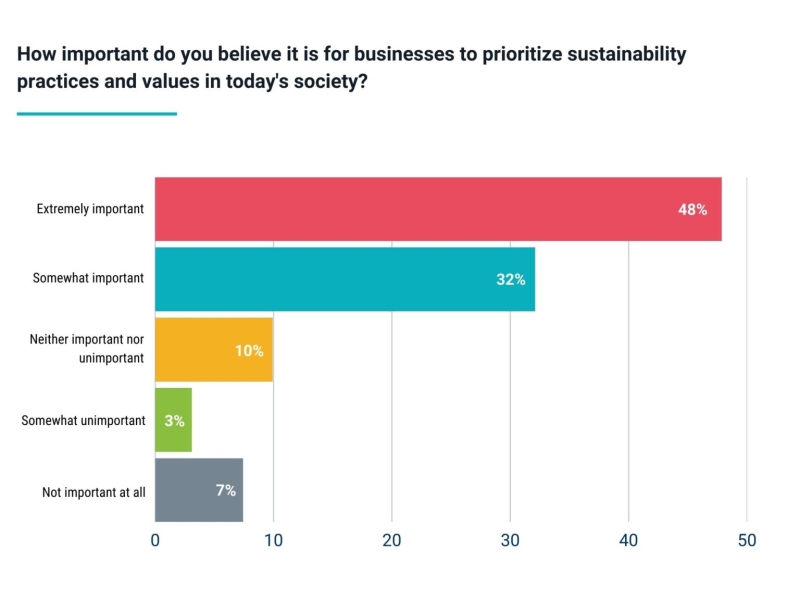
Across all age groups, 76% of respondents said that sustainability practices and values are either “much more important” (39%) or “somewhat more important” (37%) than they were five years ago.
Men perceived a more dramatic increase in importance than women, with 45% saying sustainability was “much more important” than five years ago, compared to 32% of women. Among men aged 35-44, fully 56% of respondents said that sustainability was “much more important” than five years ago.
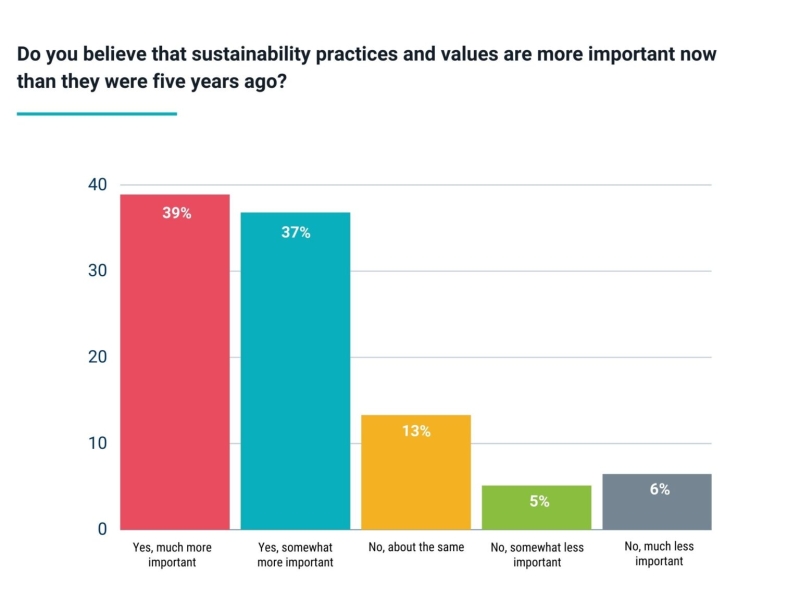
Employees increasingly consider a company’s commitment to sustainability in choosing where they want to work — with younger workers leading the charge.
Workers are increasingly considering sustainability when deciding which jobs to apply for and which employers to work for. Among all respondents, 58% said they planned to factor a company’s commitment to sustainability in their choice of employers in the future — up from 44% who considered their employer’s sustainability practices before taking their current job.
This percentage shot up to 71% for workers under 35, including 81% of women under 35. When asked, “What values would you look for in your next employer?” more workers under 35 cited sustainability than other values, such as ethical business practices (67%), social responsibility and community involvement (66%), and diversity, equity and inclusion (64%).
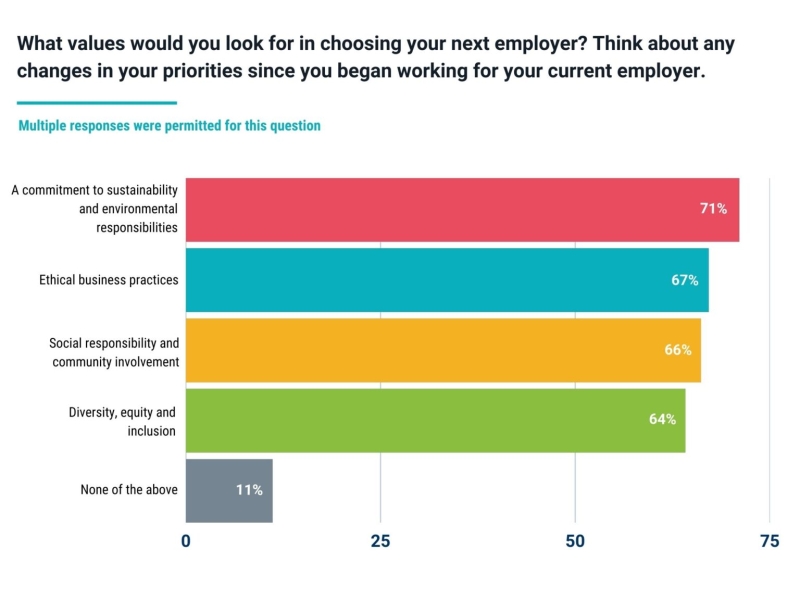
[Note: chart above shows data for workers under 35.]
Nearly three-quarters (73%) of respondents said that it was equally important for both B2B and B2C companies to “publicly express support for and get involved in sustainability causes.”
Workers expect their employers to consider a company’s environmental record when choosing vendors — and when workers have personal buying authority, they favor sustainable providers.
Workers increasingly expect their employers to favor sustainable companies in buying decisions. Two-thirds (67%) of respondents said that their employers either “always” (34%) or “sometimes” (33%) consider a company’s sustainability practices when making decisions about vendors, partners, and suppliers.
Among those respondents with purchasing responsibilities within their organizations, the majority said they weigh the sustainability record of a potential supplier, partner, or vendor before making a purchase. More than a third said they “always” consider this in their buying decisions, even when it is not mandated by their employer.
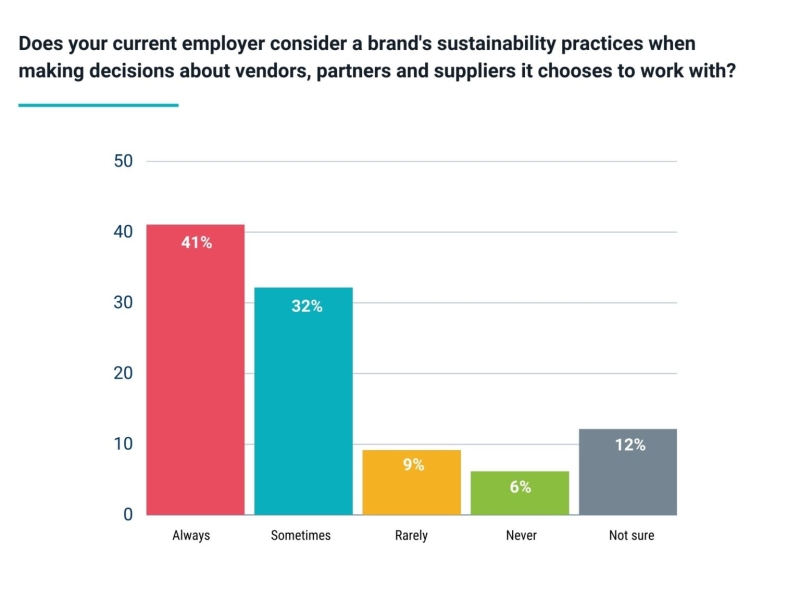
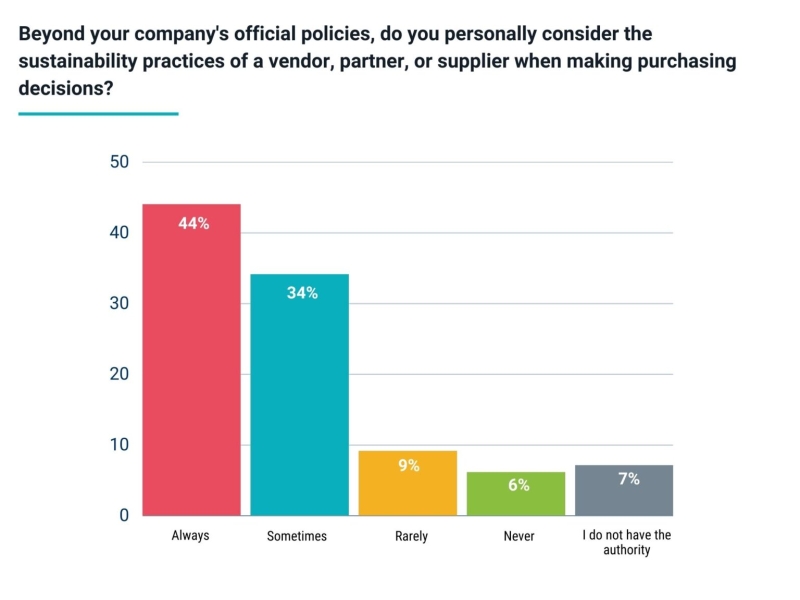
Employees’ interest in sustainability carries over to other aspects of their lives, such as personal investment decisions.
The focus on ESG carries over to workers’ personal investment decisions. Of those who currently invest in the stock market, 78% said that a company’s sustainability practices are “very important” (38%) or “somewhat important” (40%) in their choice of investments.
Nearly half (49%) of respondents said they had divested from a company because of “ethical or sustainability concerns.” Among respondents under 35, this number rose to 64%; among women under 35, it jumped even higher, to 74%.
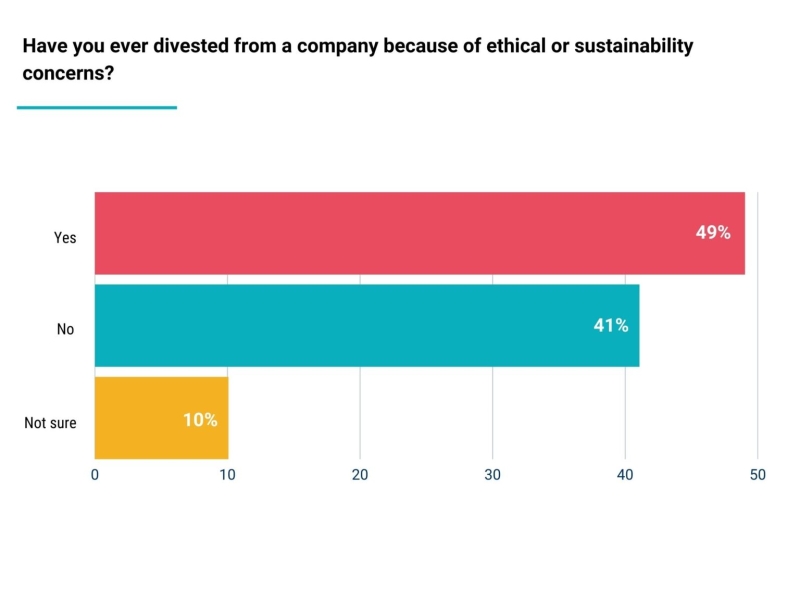
Respondents specifically called on employers to practice energy efficiency, reuse and recycle materials, and measure and minimize their overall carbon footprint.
When asked, “What specific steps toward sustainability should companies prioritize in 2023?” respondents said companies should practice energy efficiency (68%), reuse and recycle materials (65%), measure and minimize overall carbon footprint (57%), educate and train employees on sustainability practices (55%), work only with suppliers, partners, and vendors that practice sustainability (48%), and reduce paper use (43%).
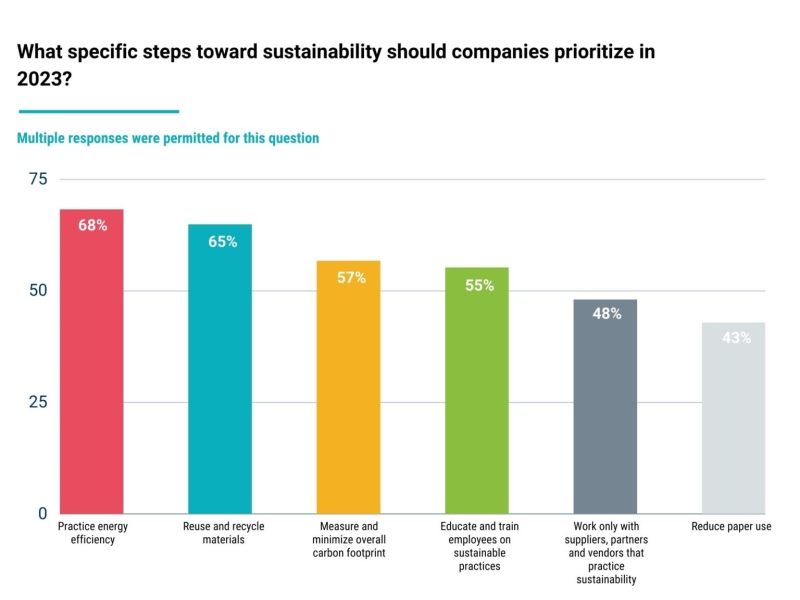
“While some companies might think that cutting back on ESG initiatives is the safe course in an uncertain economy, we believe there is more risk in turning away from our commitments,” said Jean-Michel Bérard, CEO at Esker.
“Esker embraces sustainability and encourages other companies to do so as well. It’s part of our philosophy of ‘positive-sum growth’ — tying our business success not just to our shareholders, but to all our stakeholders, including the communities we serve.”
Subscribe to new posts
